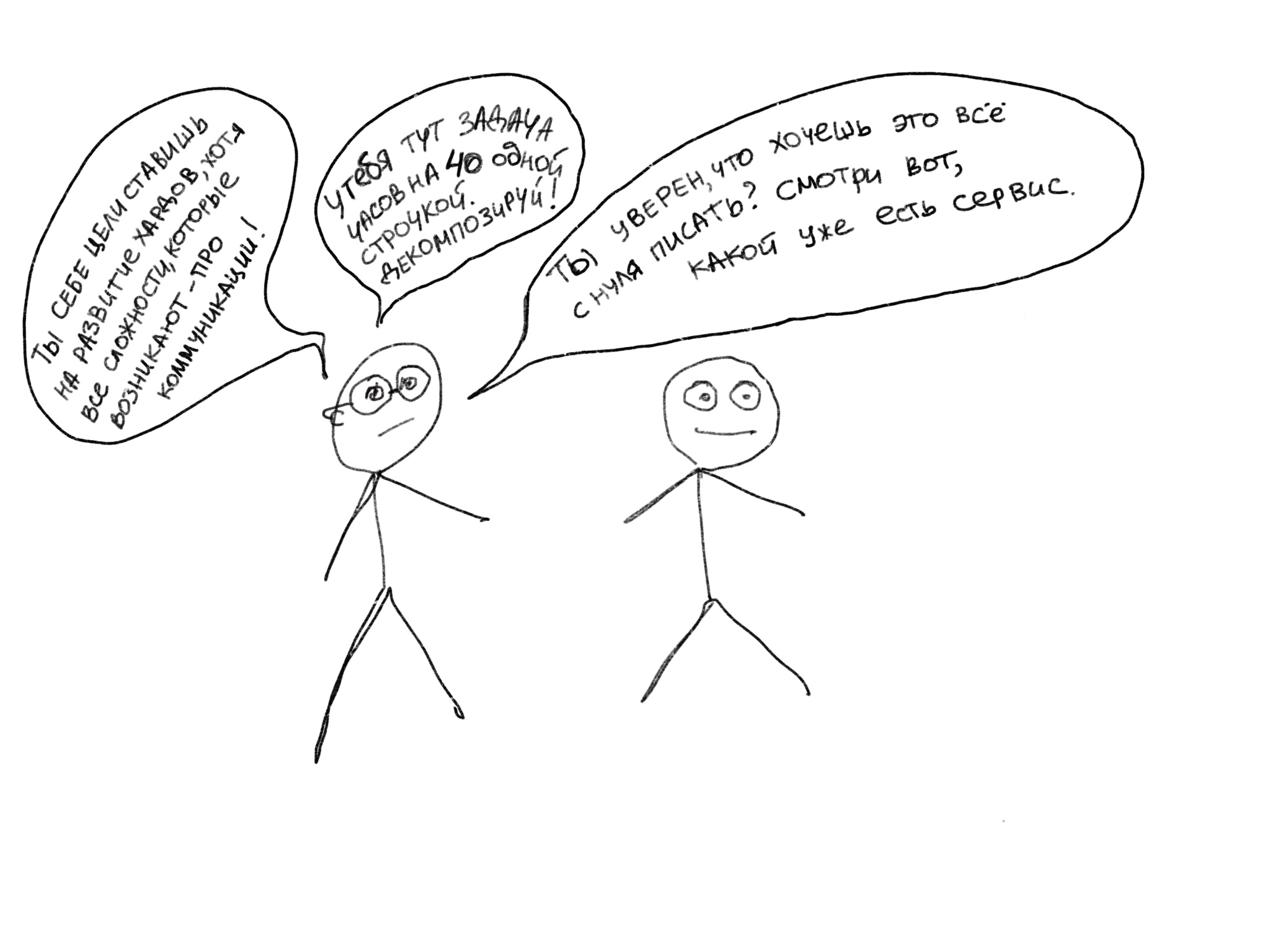To focus when there are a thousand possibilities around is objectively difficult. Here you read basic literature, then - an English-language article, and as a result you find yourself on a strange Polish forum in a thread from 2016. And it does not belong to the research topic. "What did I want to know? .."
Before meeting my informal mentor Alexei Shinkarenko in 2017, I performed an incredible amount of actions that seemed to me to be manifestations of responsible work. I remember my own indignation when he interrupted me in this ebullient activity with the questions “Stop, stop fussing. What exactly are you doing now? So what? ”, Drew mindmaps, slipped the Business Foundations course on Coursera and set the foundation for a structured approach to learning and working.
I was fascinated by this topic, and I went to understand it with friends from the IT world who came into contact with this phenomenon. We have identified what a mentor can help with and how to find one. How to position classes so that the mentor is also interested. And I also discussed why this format is more customary in the West.
The advantage of a mentor over a course and a book
Let's call this a rough shortcut to a goal: it doesn't matter which one is career or personal.
The mentor asks uncomfortable questions and confronts uncomfortable moments: returns to the goal, notices insufficient decomposition and assessment of tasks, cuts off unnecessary ones and acts as a control point to remove procrastination.
1) From the outside it is better to know what is stopping you
Svyat Zadorozhny, CTO of the HR platform Headz.io and Shortex, says what he observes in his practice: “Find out what problem you are solving, and then look for a person. Along with hardskills, developers need help with communication skills - the ability to present themselves or their ideas, communicate with the team.
A mentor is an informal leader for a specific person. It doesn't have to be an expert from the same field, even if we're talking about professional development. He should definitely be stronger than you in the question, but what profile he will have depends on how you define the boundaries of the task.
— , . , : , , , , — . , IT, BizDev, ».

2) ,
Courses and books do not solve the problem of lack of experience: when there are a lot of opportunities in your head, but what should you stake on in the first place? When to stop and, instead of learning, start to act?
Some of the most successful cases of “concentrated knowledge” and applied problem solving, which I worked with, were in the format of consultations with an expert, who pointedly pointed out what needs to be solved first of all, brought it to the level of a big picture.
Kirill Osipenko, Product Manager at McKinsey & Company, believes that most often a person can even answer his own question, but a mentor helps to navigate and identify blind spots:« « , ». – , , , . , ».
3)
The mentor asks questions on time and stops. Switching between the big picture and the details is also a skill. In the process, it is easy to dive into something that will take a lot of time, but will move not to the result, but from it.
Ivan Evtukhovich, Managing Partner of Express 42, explains: “A mentor is a senior friend. He is not inside the process, but on the side, and can notice that something is wrong.
Let me give you an example: a person is more accustomed to doing what he already knows how. If you know how to use a hammer, you want to go hammer in nails. We need to go up one level and understand "Why am I doing this?"
, . « ? ? , ?» , , ».
, :
- ,
- — « »: , ,
- ,

: ?
Working with a mentor begins with delineating the boundaries of the issue you will be working on. It is important to establish them at the very beginning, in order to understand whether the mentor has enough competencies to work with the task, and also, in order to agree on how you will understand that the goal has been achieved. Working out a technical problem will obviously take less time and effort than something deeper.
Svyat Zadorozhny focuses on the psychology of the process: “Firstly, the mentor will show deep goals: he will bring the person to a higher level, you will work out career wishes and wishes. You can compare this to professional psychotherapy.
Secondly, he can subtly hint the optimal path of development - it will show that your goal is achievable in hundreds of ways, so that you can choose the one that is closer.
Third, you will discuss what bothers you - impostor syndrome, dislike of the project's subject area, money, and uninteresting tasks.
And also - instead of sitting frustrated and reading a thousand books, you will voice specific actions on which you will focus.
Programmers have such a thing as rubber duck programming: you put a rubber duck for the bath in front of you and ask her your questions. In the process, the brain finds a solution.
People often lack only the ability to correctly voice their problem, correctly structure it in their heads, and find the answer themselves. "
Evgeny Tolmachev, an engineer in the development group of the Api4biz team at Avito, speaks about more applied issues:« — , .
, Junior , .
, , — , .*
— . , , , . ».
, :
- ,
- with a mentor, you can work out what worries - from low wages to conflict with the employer
- focus on action, not reflection
- don't waste time on details
How to communicate so that both are comfortable?
I know that it is morally difficult to approach someone who is head and shoulders ahead in the profession just like that. Where to start, how to enter, get acquainted.
It must be remembered that if you come with a weak attitude and the feeling “I’ll ask to be taught,” most likely they will refuse. There are several important things that you need to seriously think about and go to communicate with the right feeling and willingness that they can really refuse ten times, but for the eleventh - agree. And it will be good!
1) Change the usual teacher-student paradigm, ask casual questions, communicate as equals and take responsibility
Mentoring has different forms, the main thing is that there is no teacher or student. Work is collaborative through leading questions. You can work with a mentor through the corporate program according to a standard plan and with a knowledgeable companion for coffee on Saturdays, together or by gathering a group.
It is important to understand a few things for yourself: what is your task, what do you want to get in the end, and who has already passed this path. You need to tell all this very clearly to the person so that he can make a decision - whether he can help you.
Organizational issues - the frequency of meetings and feedback, the format of interaction - are individual, the main thing is that there is a system in it. Don't be afraid to propose and be proactive.
Together you figure out what are the ways, where to start.
At the same time, it is important to discuss the frequency of meetings, in what format you will discuss progress, how you will receive feedback.
To work, you need a request - to draw up a career plan for a year or three, develop a specific skill, grow from Middle to Senior developer. There is no clear goal - no mentoring. Talking over coffee, even if it's about business, is more like networking or consultation.
2) To clearly understand what the value of the mentor is in communicating with you, and feel free to focus on this
Any partnership needs a mature position: formulate in advance what you are ready to offer the mentor - time to help with his project, acquaintance or expertise.
Be sure to tell what your goal means to you. The likelihood of a positive reaction will be higher if a person finds out why you are going to your goal, and this will respond to him. Maybe you are preparing to launch your social project, and you need to level up in the frontend to improve the environment? Tell a true story about your values, and it will become clear to both if you are the right fit for each other.
Kirill Osipenko:«, , . , - — , , . - — .*
. , , . , , (, LinkedIn), , , !
, MBA - , , . -. , . : , , email', , ».
3) , ,
Do not go to people in the cold - you yourself need to collect primary data for a meaningful pitch-acquaintance.
Observation helps a lot to notice people's motivation, to understand what drives them and find an approach.
If you want to get to a certain industry expert, there is a chance to hear about what is important for him in your speeches: they often say “I like to see burning eyes and a lot of energy - it charges me”, “I want to work with those who are not interested in code , but the benefits this code creates. "
Memorize such things, find intersections with what drives you, and write about it.
Kirill Osipenko talks about different aspects of motivation:“Mentoring is an important part of my life. It means a lot to me to be useful to another person. I enjoy helping people think. To be honest, I sometimes think about leaving for an academic position and starting teaching in 7-10 years.
There are more practical considerations: mentoring develops leadership skills. And in the process of mentoring conversations, sometimes you suddenly realize that all the advice is applicable primarily to your own situation. "
Svyat Zadorozhny: “I am interested in sharing a specific experience. For example, how I solved a non-trivial task - how I chose frameworks on a new project. Where you work now, this may not be necessary, but someone will come in handy.
— , . , , .
, — , ».
, :
- : , , , ,
- , — , ,
- : ,

?
Classical mentoring appeared in Western corporations much earlier and became a standard, which gradually passed from corporations to startups, and then to Russia.
According to research from the American Society for Learning and Development , 355 Fortune 500 companies have corporate mentoring programs. At the same time, 75% of executives say that mentoring played an important role in their acquisition of this position.
In Russia, mentoring in companies is understood broadly: sometimes this is the name of training programs for major players - Yandex, Mail.ru, Avito, Sbertech, but they mean anything, including paid access to online platforms, training budget and performance review.
My guess is that mentoring in the UK and US is organically woven into business relationships because people are used to being actively involved in the community.
For example, there is the concept of alumni association - associations of university graduates. Students turn there to understand the distribution of the professions market, prepare for an interview with a specific company, and come up with a development plan. And therefore, in adulthood, it is quite natural to turn to a colleague in the market for help.
I was struck by the story of Yulia Nechaeva , a product manager from Youtube, based on her training at the Haas School of Business, UC Berkeley, that coaching each other for interviews in a company is generally the norm.
Kirill Osipenko, an MBA graduate from the University of Chicago, says: “In American culture, it is common to rally around something - a university, an organization, a professional community. When people tell their stories, they certainly say that it is important for them to feel a contribution to a common cause. We had meetings with alumni, where they gave advice and held panel discussions. Such connections help not only in business schools: if, for example, write to people on LinkedIn and refer to some intersections in terms of education or professional experience, then most likely your messages will not go unanswered. "
By the way, a mentor is not necessarily one person. Bill Wright-Swaddle of Duke University voiced the conceptthat it's a good idea for everyone to have their own metaphorical Board of directors - familiar experts in different disciplines. And then arrange regular short meetings and build skills, and also handle pinpoint queries. At the same time, it is good if they are from different contexts - someone taught machine algorithms at your university, someone studied in parallel and even then adored economics, you got along with someone at your first job. This approach will provide a broad perspective from people from different professional areas, with different experiences.
And again, just briefly:
- Although mentoring is a tool with quite obvious benefits, it is much less widespread in Russia, especially in a formalized form.
- In the West, he is more familiar. Perhaps a lot due to the fact that universities have alumni associations and a tradition of helping each other
- A mentor is not necessarily one person. There may be different advisors at different stages and on different issues
How to find a mentor in our realities?
1) You can look for a mentor yourself - at conferences, in social networks and Facebook groups about mentoring, by acquaintances
In this case, more attention should be paid to researching your goal, observing the experts and understanding what you can offer in return, so that you know exactly who and why you are going. Some take mentee for money. Facebook has a group of Digital Mentors .
Svyat Zadorozhny recommends: “Start by deciding whether you really need an expert in the field of IT? Maybe someone with experience in teamwork will do? Then you can look elsewhere - for example, in coaching institutes.
, . – -50 CTO , , . , - .
, . : . , , HighLoad++ — ».
2) ,
Be sure to check what specific processes are in the company. Sometimes mentoring in a company exists at the idea level, but not at the implementation level. If you go looking for a mentor in a company, offer a clear process of how you will work.
“It all depends on the company, corporate culture and structure.
In my opinion, an important block of CTO tasks is to develop the team: the architectural, technical and business skills of people. Share knowledge and approaches, convey the peculiarities of thinking and explain how you make decisions.
This is not always encouraged at the corporate level in large companies. If the structure of the company is flat, there is the concept of a team as a single entity, where everyone can communicate with everyone - the CTO may well act as a mentor, and this will benefit everyone - business and employees.
The structure strongly influences the form: often you physically cannot communicate with everyone. When I had three teams, I did training seminars and workshops. At the same time, I told how I think and offered to try my methods on my own and tell what happened in the end.
With this approach, everyone is motivated, they understand the business goal, they know what we are doing and why , ”adds Svyat.
3) Participate in projects where mentoring is woven into the learning process
There are educational programs where there is group mentoring, support in solving the problem.
The mentor discusses the task with the team - repeatedly asks the question "why do you want to do this?", Suggests how to choose a tool and technology, what exactly needs to be taken into work, and what is not at all important, even shares useful contacts and initiates mini-lectures on sensitive issues.
Mentors point out the weaknesses of the project, reflect together with the team, why it turned out that way, lay the right approach and thinking.
It’s easier to get to know the format in this way, because you don’t need to organize classes yourself.
And again, just briefly:
- You can look for a mentor yourself, through the company where you work or programs that have mentoring.
***
In general, contacting a mentor - regardless of the format in which it will work for you - is a big step into the world of opportunities. Once you feel the drive of teamwork, you can transfer the same approach from the work sphere to others, and quickly come to a result through the expertise of people around, and be useful to them yourself.
It takes an effort to move from the familiar teacher-student model to a position of equal dialogue, to learn to ask non-routine, real questions that move forward, to learn to be bold in admitting that you don't know something yet. But it's definitely worth it.
Who wrote
- Alisa Gozina-Plekhanova, developing a mentoring community;
Who helped me
- , Shortex HR- Headz.io. , ;
- , Product Manager McKinsey & Company, ;
- , Api4biz Avito, , ;
- , 42, 15 . , .